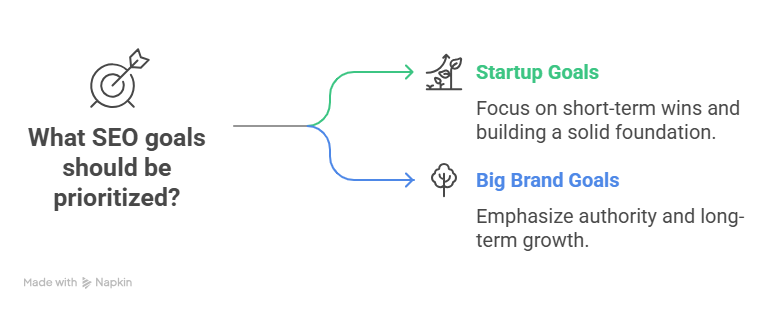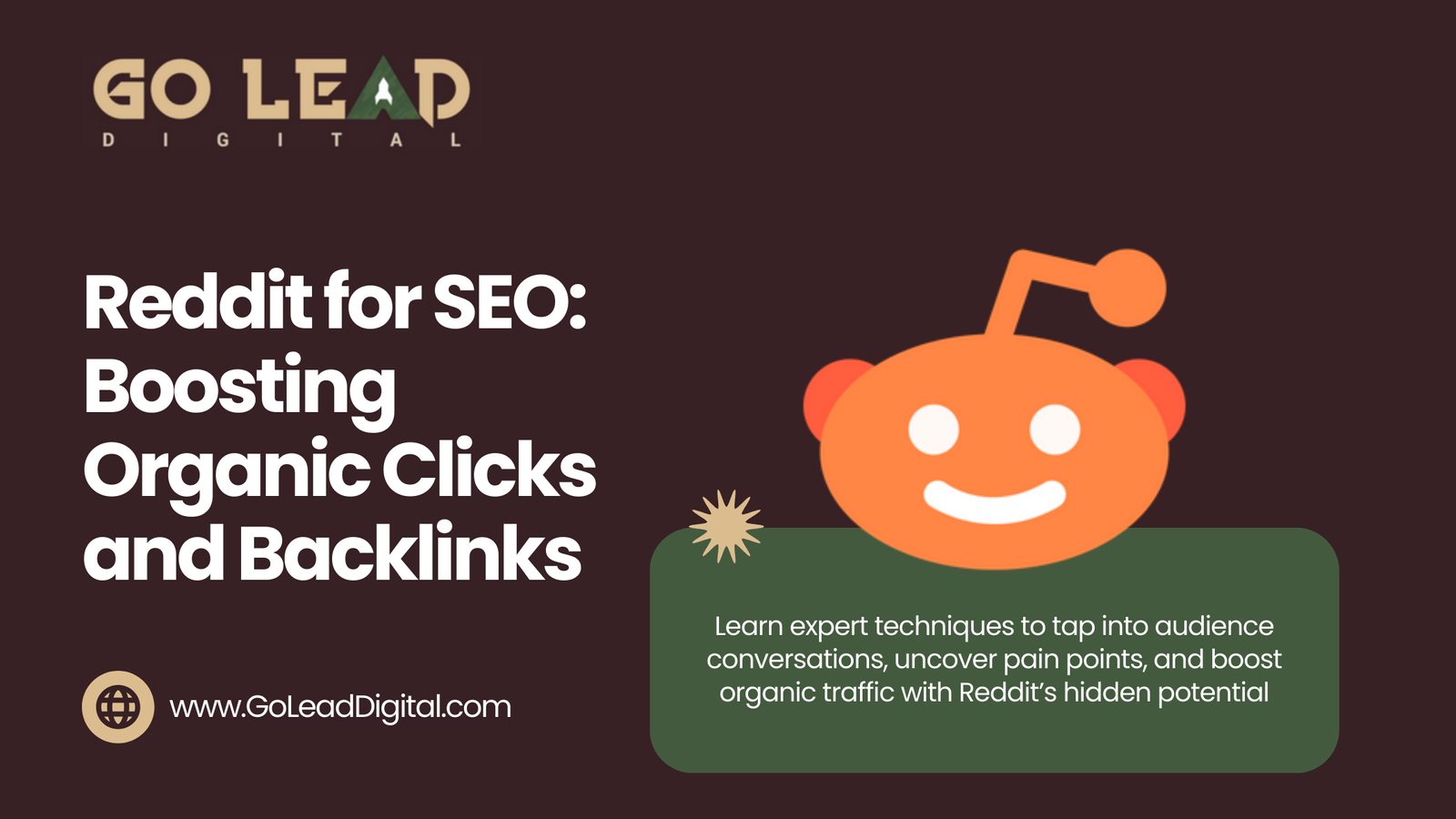SEO for Startups vs. Big Brands: The Battle for Digital Dominance
Discover how SEO strategies should differ for startups and big brands. Learn what works for each stage of growth and how to execute SEO tactics for maximum impact. Insights from Roshan Samuel Ambler, CEO of Go Lead Digital.
SEO strategies cannot be treated like one-size-fits-all solutions; therefore, individual strategies need to be customized depending on each business and industry they operate in. What works for a well-established brand with multimillion-dollar budget and extensive backlink profile will not work as effectively for an emerging startup looking to disrupt an industry.
The fundamental difference? The stage of business growth. SEO tactics need to change based on where you are in your business journey, and this distinction is more important than ever in today’s hyper-competitive digital landscape.
As the founder of Go Lead Digital and an expert digital marketer, I’ve had numerous conversations with startup founders and marketers at established companies about their SEO struggles and approaches to digital marketing. Their differences couldn’t be starker; that’s why I want to outline exactly how SEO should differ for startups, SMBs growing quickly, and established brands.
By understanding your company, you can optimize your SEO strategy to leverage its current advantages, avoid costly missteps and spur meaningful growth.
Let’s examine how SEO should be employed at different stages of business expansion, and how your unique advantages can help outwit competitors.
Key Takeaways
- Startups: SEO is your budget-friendly superhero—helping you rise up against the giants without emptying your pockets. Startups need to focus on niche, long-tail keywords and hyper-targeted content with a strong focus on building topical authority.
- Established brands should scale by targeting competitive, broad keywords, performing content audits, and leveraging brand recognition in their SEO strategy.
- SMBs sit in the middle—finding a balance between long-tail and competitive keywords while expanding their content and link-building strategies.

Why SEO is Essential for Every Business
Welcome to the SEO showdown! Whether you’re a scrappy startup trying to make a name or a massive multinational trying to maintain your throne, SEO is your digital best friend. But let’s be real—not all SEO strategies are created equal.
For startups, SEO is like the cool, underdog hero that helps you outsmart the big guys without burning a hole in your wallet. For big brands, it’s more like that strategic mastermind pulling the strings behind the scenes to ensure you’re everywhere your audience looks. So, what gives?
In this article, we’ll break down the whys, hows, and whats of SEO for startups vs. big brands. Expect stats, trends, and maybe a few memes (if I’m feeling spicy).
What is SEO for Startups?
SEO is the unsung hero of the digital world. For startups, it’s often the difference between being a ghost on Google or having your content pop up when someone searches “best vegan coffee shop in town” (yes, that’s a thing now).
For those just getting started, SEO is about building your foundation: ranking for the right keywords, creating killer content, and making sure your site loads faster than a coffee on Monday morning. It’s all about visibility without the need for pricey ads or massive budgets.
Why Should Startups Care About SEO? Because Word of Mouth Only Goes So Far
If you’re a startup founder, you probably already know how many hats you have to wear—CEO, CFO, HR manager, social media guru, and, of course, the unofficial office therapist. But here’s the kicker: without SEO, all that hustle might go unnoticed.
Investing in SEO is like buying a pair of well-fitted sneakers for your website—they’ll make everything run smoother and faster. And let’s face it, organic traffic beats paying for ads any day.
- Cost-Effective Marketing: No need for a billion-dollar marketing budget. Just a bit of strategy, some clever keyword research, and voilà—welcome to your new traffic flow.
- Long-Term Growth: SEO isn’t just a quick fix. It’s the gift that keeps on giving, year after year.
- Credibility and Trust: Being visible in search results builds trust. It’s like seeing your favorite local store on Google Maps—it gives you peace of mind.
Does Company Size Affect SEO Strategy? Absolutely, But It’s Not as Complicated as You Think
Here’s the thing: SEO strategies vary depending on the size of the company, but it’s not rocket science. Here’s the breakdown:
- SEO for Startups: For you, it’s about agility. You need local SEO, hyper-targeted keywords, and well-written content. Think of it like creating the ultimate playlist—focused, but packed with hits that’ll make people notice.
- SEO for Midsized Businesses: Mid-tier companies start investing more in diverse strategies. That means stronger backlink profiles, improved website speed, and some serious content marketing.
- SEO for Large Companies: Now, we’re talking big guns. SEO for large brands is intertwined with massive content strategies, paid campaigns, and even more paid campaigns (because why not?).
But here’s the thing: the heart of SEO remains the same for all businesses—getting your website in front of the right eyes.
How Much Do Big Companies Depend on SEO or Search Traffic? Spoiler: A Lot.
You might be thinking, “Do big companies really rely on SEO?” And the answer is a resounding yes. In fact, big brands depend heavily on SEO for their digital presence. Here’s some food for thought:
- 93% of online experiences begin with a search engine (Statista). That means whether you’re a startup or a multinational, if you’re not showing up on Google, you’re practically invisible.
- 75% of users never scroll past the first page of search results (Search Engine Journal). Ouch. Big brands know this, which is why their SEO teams are working overtime to ensure they’re not just “on the first page” but in that sweet spot at the top.

SEO Goals: Startup vs. Big Brand (It’s Like Comparing Apples and Oranges, But Both are Delicious)
So, how do SEO goals differ between startups and big companies? It’s not as dramatic as you might think, but there are key differences:
- Startups: You’re probably focused on short-term wins like ranking for a few well-chosen keywords and boosting local visibility. Your goal? Build a solid foundation.
- Big Brands: For them, SEO is more about authority and conversion optimization. It’s about maintaining that leadership position in search results and optimizing for long-term growth.
Startups: Low-Cost Channels + SEO-Optimized Websites (Think of It as the Swiss Army Knife of Digital Marketing)
As a startup, you don’t have the luxury of splurging on paid media campaigns. What you do have is the ability to build a lean and mean SEO machine. Focus on:
- Content that answers real questions: FAQs, blogs, and guides that align with what your audience is searching for.
- SEO-optimized website structure: Clean URL structures, fast loading speeds, and mobile optimization. Think of your website as your digital storefront—it should be easy to navigate and make people want to stick around.
Large Companies: Brand-Led Ad Campaigns + Conversion Optimization (More Money, More Strategy)
For big brands, SEO isn’t just about organic traffic. It’s often part of a bigger picture—a delicate dance between SEO, paid media, and conversion rate optimization (CRO). The goal here is to build brand authority while maximizing conversions through:
- Sophisticated content strategies that target both bottom-of-the-funnel customers and brand-new prospects.
- SEO campaigns combined with massive ad spends that flood the market with brand presence.

Key Statistics Highlighting the Power of SEO for Startups
Let’s look at a few stats that’ll make you rethink your entire digital strategy:
- 61% of marketers say improving SEO and growing their organic presence is their top inbound marketing priority (HubSpot).
- 93% of online experiences begin with a search engine—Google dominates, so if you’re not playing on their turf, you’re missing out.
- 75% of users never scroll past the first page of search results (Search Engine Journal). If you’re not there, it’s like you don’t exist.
The Startup SEO Playbook: Guerrilla Warfare Tactics
The Challenges of Startups: Limited Resources, Big Dreams
Startups are hungry, ambitious, and innovative—but they often face serious challenges when it comes to SEO. These businesses usually have limited or no domain authority, little to no backlink profile, and very little brand recognition. Your resources (budget, time, and manpower) are constrained, and it can feel like you’re David vs. Goliath in a battle for search engine dominance.
As a result, startups must focus on a hyper-targeted SEO strategy to get traction without breaking the bank. This means making strategic decisions about where to allocate your limited resources, how to build your brand presence, and which tactics will deliver the fastest ROI.
Where to Focus Limited Resources: The Targeted Approach
For startups, competing for highly competitive, broad keywords (e.g., “SEO services” or “digital marketing agency”) is not just impractical, it’s financial suicide. These terms are dominated by big players with massive budgets and authority—think HubSpot, SEMrush, or Neil Patel. Instead, startups should target low-competition, high-intent long-tail keywords.
Here’s the type of long-tail keywords startups should focus on:
| Keyword Example | Why it Works |
| “project management software for remote architecture teams” | Clearer intent, low competition |
| “best construction PM software for small contractors” | Niche audience with high intent |
| “kanban tool for solo consultant time tracking” | Low-volume but highly specific |
These long-tail keywords have lower search volume, but they are easier to rank for and have stronger buyer intent. By focusing on these terms, startups can rank within 2-3 months, compared to 2-3 years for broad keywords.
Building Content Clusters Around Target Keywords
The best way for startups to build SEO authority is through content clusters. This approach helps create a topical authority on a specific subject, which is crucial when you have limited domain authority. Here’s a simple approach to content clusters:
- Main Pillar Content: Create a comprehensive guide or page targeting the primary long-tail keyword (e.g., “project management software for small contractors”).
- Supporting Articles: Create 5-7 supporting blog posts that target related long-tail keywords, such as “project management for small businesses” or “best kanban tools for contractors.”
- Internal Linking: Ensure that all the supporting articles are linked to the main pillar content, which will pass link equity and boost rankings.
This strategy builds topical authority, helping Google understand that you’re an expert in a specific area. You might not have the backlinks of a HubSpot, but with the right content structure and focus, you can still rank for niche terms.
Use Your Founder Story to Stand Out
As a startup, you might not have a lot of resources, but you have something more authentic and engaging—your founder story. This is an incredibly powerful way to create human-centered content that resonates with potential customers.
- Share your journey—how you got started and the obstacles you overcame.
- Provide behind-the-scenes content that shows the process of building your product or service.
- Discuss the lessons learned and mistakes made, which can make your brand feel more relatable and approachable.
Not only does this type of content help build trust, but it also makes your startup stand out from competitors that might feel corporate and detached.
Link Building: Focus on Tactical, High-Impact Opportunities
With limited time and resources, startups must be strategic about link-building. While big brands can afford systematic link-building campaigns, startups should focus on quick-win, high-impact opportunities:
- Guest Posts on Niche Blogs: Publish 2-3 guest posts per month on blogs that have a dedicated audience in your industry. This builds your authority and links back to your content.
- HARO Submissions: Submit to Help a Reporter Out (HARO) 3 times a week to get featured in news articles or industry publications, earning valuable backlinks.
- Podcast Interviews: Reach out to podcast hosts in your niche for interviews. Being featured on a podcast can provide credibility and valuable backlinks.
The Established Brand SEO Playbook: Scaling with Authority
The Advantages of Big Brands: Domain Authority and Resources
If you’re part of an established brand, you’re playing SEO on easy mode. Your brand likely already has:
- Strong domain authority (from years of content, backlinks, and brand recognition).
- An extensive backlink profile, including natural links from mentions, press, and partnerships.
- Existing content that has already earned trust and engagement.
For large brands, the challenge isn’t getting started; it’s scaling efficiently while maintaining a competitive edge in an ever-changing SEO landscape.
Where to Focus Resources: Dominate Broad, Competitive Keywords
With strong domain authority, established brands have the luxury of being able to compete for broad, high-competition keywords. For instance, keywords like “project management software”, “team collaboration tools”, and “best CRM systems” are well within reach.
Big brands should focus on:
- Keyword Expansion: Target competitive keywords within your industry that you can rank for in months, not years.
- Content Audits: Regularly audit your existing content for performance. Refresh outdated content, fix cannibalization issues, and consolidate thin content into comprehensive guides.
- Industry Reports: Leverage your brand recognition to produce state-of-the-industry reports, case studies, and “[Your Brand] vs. Competitors” content. This can be incredibly valuable for ranking and building trust with your audience.
Link Building: Systematic and Scalable
For established brands, link-building can be much more systematic and structured:
- Digital PR Campaigns: Leverage your brand’s recognition to launch PR campaigns aimed at earning links from authoritative publications.
- Linkable Assets: Invest in creating data-driven content like surveys, studies, or industry-specific whitepapers that naturally attract backlinks from high-quality websites.
- Customer and Partner Relationships: Use relationships with customers, partners, and industry influencers to secure valuable backlinks.
The Middle Ground: Growing SMBs and Their Unique SEO Needs
SMBs: Balancing Between Startups and Big Brands
If you’re a growing SMB, you’re likely in a unique position: not quite a startup but not yet a big brand either. Your resources are more abundant than a startup, but you’re still competing with larger players for authority.
For SMBs, it’s crucial to balance between long-tail keywords and some moderately competitive terms. Focus on content clusters but gradually expand your scope as you win territory.
Your link-building efforts should be a mix of tactical opportunities (e.g., niche guest posts, industry partnerships) and systematic outreach as you scale.
Conclusion: No Matter the Size, SEO Wins the Race
Whether you’re just starting out or leading the market, SEO is your secret weapon. For startups, it’s about getting the basics right and building momentum. For big brands, it’s about maintaining authority and optimizing for conversions.
Remember: SEO isn’t a one-time thing—it’s an ongoing commitment that pays off big in the long run. So, which strategy fits you? Well, that’s up to you, but whatever your size, the SEO race is one you want to win.
Frequently Asked Questions (FAQs)
Q: Why should startups invest in SEO?
A: SEO helps startups gain organic visibility, build brand authority, and compete with larger brands—all without the hefty ad spend.
Q: How does SEO for a startup differ from a large company?
A: Startups focus on niche keywords and local SEO, while large companies use a combination of organic and paid strategies for brand dominance.
Q: How long before SEO shows results for startups?
A: Expect noticeable results in 3-6 months, depending on your industry’s competition.



